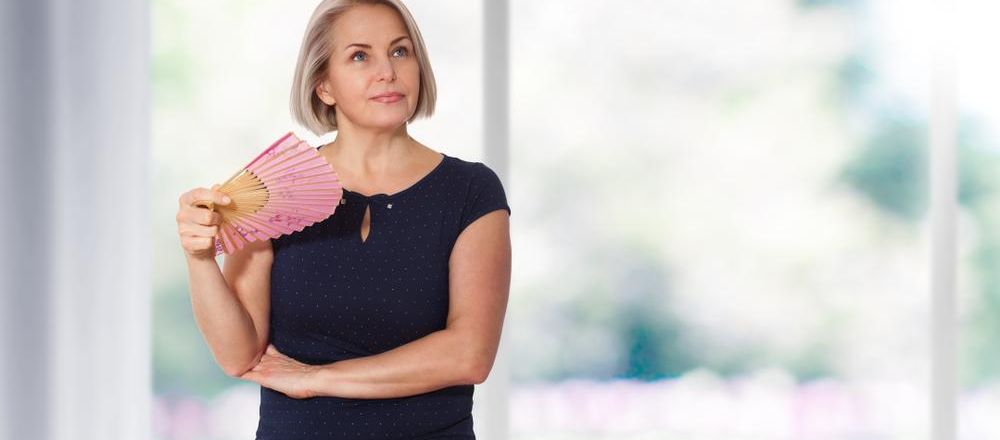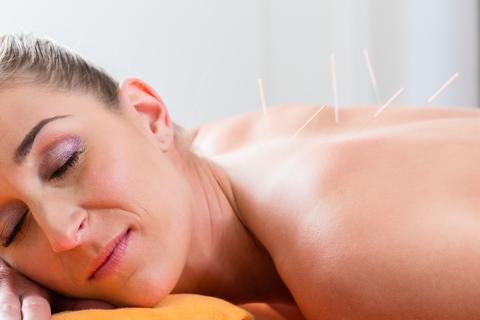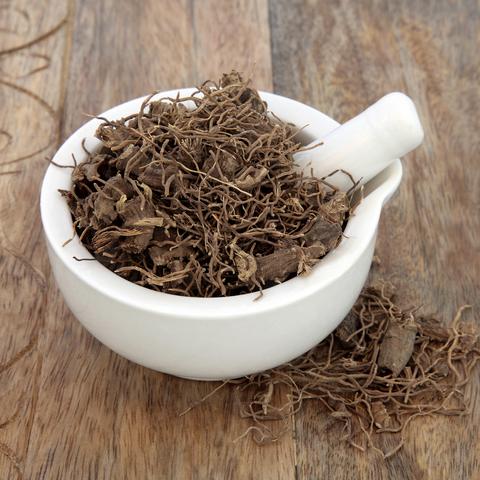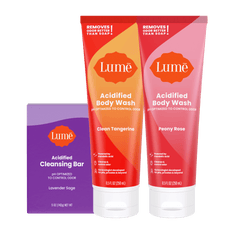
Managing Hot Flashes Through Menopause
by Sarah Thomas
Last year at my annual lady exam, my nurse practitioner suggested we test my blood to see if I was in menopause. She called me the next morning to confirm that I was, in fact, officially menopausal.
So I asked, “OK, so what does that mean?”
She replied that it just means I can look into considering hormone replacement therapy. Otherwise, I received no instruction for this next phase of my life. Shouldn’t there be a manual given to all women once our lives take an about-face? (There isn’t.)
I had a moment in which I peppered myself with questions. If that door is now closed, did I make the most of it? Did I have enough babies? Should I have tried the period cup? Now, I’ll never know. There is a bit of joy, and a bit of reflective melancholy.
It was also as if my body heard the call, flipped the switch, and commenced sweating like a menopausal woman. Someone needs to find a way to harness the power of this heat, it’s off-the-charts! I’m pretty sure I could light up the Las Vegas Strip for a week.
We May Have Aged, But We Are Smokin’ Hot!
It is difficult to explain what a hot flash feels like, but if you have had one, it is unmistakable. A hot flash is a sudden and explosive sensation that takes over you and makes you completely lose your train of thought. It can cause you to feel a bit desperate, like an animal caught in a trap. All you can think about is how fast you can remove an article of clothing and find some moving air.
What causes hot flashes? Would you believe we really don’t know? For some reason, the drop in the hormones estrogen and progesterone cause disruption with your body’s temperature control system and cause occasional and sudden rises in your core temperature.
Like everything else, women can have vastly different experiences with hot flashes both in severity and frequency. A hot flash experience can range from, “Did someone turn up the heat?” to “I would trade one of my children for a cup of crushed ice right now.” Hot flashes affect women for about five years on average, but can rudely stick around for up to 14 years.
The most effective way to manage hot flashes is through hormone replacement therapy (HRT).
Women naturally produce less estrogen and progesterone as their supply of eggs dwindles.
Supplementing hormone levels can decrease hot flashes and sweating, reduce the risk of osteoporosis, and help alleviate other menopausal symptoms like vaginal dryness and irritation.
HRT comes with some risks, such as the increased risk of heart disease, stroke, blood clots, and cancer. Risks seem to be minimal if taken for a period of five years or less, according to Mayo Clinic.
There are some who should not consider HRT, including women who have had breast cancer, ovarian cancer, endometrial cancer, blood clots in the legs or lungs, stroke, and liver disease.
Whether or not you choose hormone replacement therapy is a decision you should make with your doctor. There isn’t one answer that fits all.
Natural Firefighting Remedies
If you opt out of HRT, there are a number of natural remedies to either manage hot flashes or manage your response to hot flashes. No single method seems to be the magic bullet, but experimenting with any one of these healthy habits could result in relief. And none are likely to kill you. So there’s that.
Feel like you are going to spontaneously combust? Experiment with these:
Learn Some Relaxation Techniques
While learning to relax doesn't decrease the frequency or severity of hot flashes, it can help you roll with them.
Try learning some relaxed breathing techniques. “Paced respiration” is one such technique, and is simply setting aside a couple of times a day to practice breathing in slowly and deeply for a count of five, then exhaling slowly and completely for a count of five. Repeat when you are in the midst of a steamy flash. It really does help to relax so you don’t feel like the caged animal I referred to above.
Consider downloading an app to help you develop some meditation skills. “Mindfulness training helps you become aware of the present moment, without focusing on the past or future.”
Mindfulness won’t stop hot flashes, but it can certainly help keep you calm and rational in the middle of the night when you are feeling frustrated.

Yoga
Yoga plays nicely with relaxation and mindfulness. Learning to relax and reducing stress through yoga can be helpful in managing hot flashes. While results from studies about yoga and reducing hot flashes are mixed, many women in this study experienced a reduction in hot flashes when practicing yoga. The thing to keep in mind is that results will be seen over time, with consistent practice.
Yoga classes can be expensive, but there are a lot of inexpensive or free options available (online, YouTube, yoga apps, or donation-based yoga) to help you reap the benefits of yoga, some even in your own living room.
Acupuncture
Acupuncture, a traditional Chinese medicine that involves inserting extremely thin needles into strategic points on the body, is gaining popularity. We are just coming to some understanding of the positive effects it can have on our mind and body. In one study, acupuncture was found to greatly relieve hot flashes in some women.
Women who received 6 months of acupuncture experienced 37 percent fewer hot flashes daily, while the group who didn’t receive acupuncture reported a 6 percent increase of hot flash symptoms. Months after treatment stopped, the group who received acupuncture still maintained reduced hot flash symptoms.

Add Some Phytoestrogens to Your Diet
Phytoestrogens are natural compounds found in plants and plant-based foods that act like estrogen when eaten. Soy and flax are among the highest in phytoestrogens, but they are found in many fruits, veggies, whole grains, and legumes. (You can find a more complete report and list of foods here.) Incorporating these foods into your daily diet may provide some relief from the sweats.
As with other remedies, results from studies about phytoestrogens are limited and mixed. Some women get relief from hot flashes from phytoestrogens while others are unaffected.
Black Cohosh
Black cohosh is an herbal supplement that has been used for centuries to treat hot flashes and other menopausal symptoms because it contains phytoestrogens.
Black cohosh is not proven to work for everyone, but many women have had great results (including me). Like all supplements, it is not regulated by the FDA, so you’ll want to order from a trusted source. 160 mg is a common dose, which usually amounts to 4 - 40 mg. capsules, depending on your manufacturer. You can take two in the morning, and two before bed.

Don’t Smoke
When you smoke, nicotine releases a chemical called acetylcholine that raises your body temperature, heart rate, and blood pressure. This signals your body to rev up the cooling machine and start sweating. Nicotine can also contribute to night sweats and hot flashes.
Quitting smoking can cause an increase in sweaty episodes, but only temporarily. It’s tough to curtail long-standing habits, but your body will thank you.
Avoid spicy foods and hot drinks
News flash: Hot foods and hot drinks can make you feel hot!
Receptors in your body respond to heat - whether from spicy food or temperature and raise your body temperature, which kicks in the sweaty cooling system.

Caffeine in Moderation
Your morning coffee gives you the boost you are looking for, but it also gives your sweat glands a little boost. Caffeine stimulates the central nervous system by triggering the release of adrenaline and puts your body in fight or flight mode, which causes you to sweat. Make that a hot cup of coffee, and it’s a double whammy.
When hormonal fluctuations are already likely to cause you to feel a bit anxious about things that might not have bothered you before, too much caffeine can heighten that feeling. Caffeine can also be a sleep disruptor, and many going through menopause have trouble getting a full night’s sleep.
Drink caffeine in moderation, and consider cold coffee drinks to avoid a flare.
Alcohol In Moderation
When you drink, alcohol in the bloodstream causes the vessels to enlarge, which can increase the temperature of your skin and signal your body to start cooling by perspiring. As with nicotine and caffeine, alcohol can contribute to hot flashes, night sweats, and sleep disruption.

Chill!
Do a computer search for “menopause pillow,” and you will get dozens of options for cooling pillows, or “chillows.” Gel and water-based pillows promise a more comfortable night’s sleep by helping to regulate your temperature. If you want some daytime chill, there are chilling towels that are especially great for warm weather. Soak your towel in cold water, wring it out, and drape around your neck for a quick cool down.
Strategic Bedding and Sleepwear
Microfiber sheets and fleece pajamas may be all the rage and feel super soft to the touch, but fabrics made from synthetic fibers do not breathe well and will make you sweat more during the night.
Bedding and PJ’s made from natural fibers like cotton and linen are breathable and absorb moisture. They help regulate your core temperature for a cool and dry sleep. Even if you experience night sweats, cotton sheets and pajamas tend to dry faster and allow for a deeper rest.
You can also layer bedding in a way that will be easy for you to separate during the night. When a hot flash hits, you’ll throw everything off to cool down. Because your sweat is so good at cooling you down, you’ll find yourself layering up again in no time. Sometimes you just have to split the difference with one leg out.
Wear Breathable Clothing
Ladies, your bodies are beautiful and functional, and now is not the time to worry about shapewear.
Put the spandex down, and breathe easy in cotton, linen, and even lightweight Merino wool. Natural clothing fibers are great for breathability, and some can even help thermoregulate your body.
Don’t forget to layer your clothes, because you are going to be repeating the off and on again routine throughout the day!
This Hot Flash, Too, Shall Pass
Get a beautiful Asian fan, crank up the AC, stand in front of the open refrigerator – do whatever it takes to be comfortable. And know that, in a few minutes, your hot flash will pass. Keep calm and carry on, as the British say.
Odor Is Optional With Lume
Of course, an increase in sweating might lead you to worry about an increase in odor. They like to travel together. And any menopausal woman can tell you that a hot flash is a veritable firestorm that does not limit itself to the armpits...
But don’t you worry!
Lume Whole Body Deodorant is the only deodorant that is safe and effective at controlling external odors everywhere. Use it in all of your sweaty unders and in betweens: pits, privates, skin folds, underboobs, and even feet.
Lume Deodorant was developed by Dr. Shannon Klingman, an OB/GYN, with women in mind, originally to control “feminine” odors. Happily, it turns out to be the best deodorant for controlling ALL body odor, for every kind of person. That’s because Dr. Klingman discovered that odor is caused by the same reaction on the entire body– the reaction that happens when skin bacteria combine with fluids (like sweat, semen, urine, and more), they digest them and fart out odor. Lume shows those mischievous little bacteria who’s boss and stops the odor reaction before it even has a chance to begin.
Not only is Lume a whole body deodorant that’s safe to use ANYWHERE you have odor but wish you didn’t, it’s also clinically proven to control odor for up to 72 hours, so it can really provide some added confidence during a tough transition like menopause.
Lume Deodorant Wipes include the same active ingredients as Lume Deodorant and are a great way to control sudden hot flash odor when you’re on the go. When used with Lume Deodorant in an easy hygiene routine, odor really becomes an afterthought. Lume takes care of body odor so you have more time to take care of you.
You’ll love it so much, you might want to share the Lume love with someone you know!
Menopause can be a time for reflection, self care, and changing to healthier habits. You may find you have a little more time and freedom to focus on yourself. So explore new hobbies and interests, try new things, and surround yourself with the things that make you happy. You have much to look forward to!
Did you Lume today?
Recent Articles
- Your New Indulgence: Introducing Vanilla Bliss
April 04, 2025
- Feminine Hygiene Myths: A Tale As Old As Time
March 24, 2025
- Do Showers Control Body Odor?
March 18, 2025
- The Skin Loving Benefits of Mandelic Acid
February 28, 2025
- Why Is Acid In My Deodorant?
February 28, 2025
- What Are AHAs?
February 28, 2025
- 3 Helpful Tips For Getting Started
February 28, 2025
- Unlocking Smoother Looking Skin: Lume's Guide to Managing KP
January 29, 2025
- Drier Days Are In Your Pits’ Future!
January 15, 2025
- This Spray Slays
January 10, 2025
















